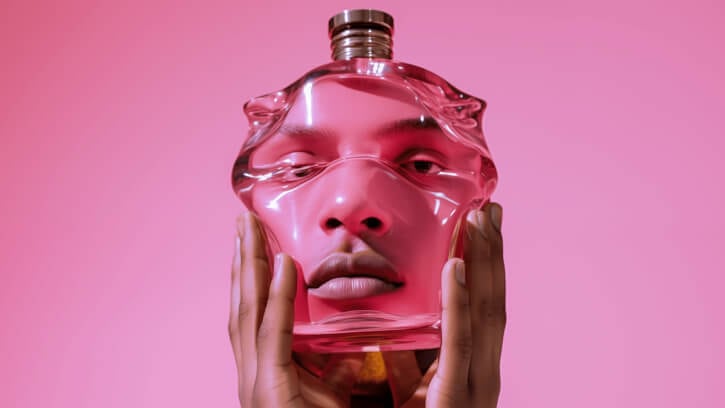According to The Future Laboratory’s Director of Foresight Fiona Harkin, its new report about how society will change in 2024 was built around what brands, businesses and collaborators ask the company about the most, as well as the subjects its experts think they should be asking about.
Topics it emphasised were:
- AI: in terms overcoming the ethical issues and fear around the technology to build positive outcomes for people, the planet, society and the creative industries.
- Sustainability: and why brands will need to embrace radical transformational business opportunities, while finding new ways to communicate their approaches to eco-fatigued consumers.
- Home & Family and Identities: in terms of highlighting the opportunities and challenges created by shifting demographics and attitudes.
- Mobility: futuristic technology and the influence of the new space age.
Spotlight on artificial intelligence
Harkin highlighted that AI comes with a host of ethical issues and fears, but that 2024 will be the year we collectively improve our understanding of how the technology can “empower a new golden age of human creativity and create design codes that are optimistic and joyful, rather than dystopian and slightly eerie.”
She said there will also be new uses for AI in terms of alleviating loneliness and adding meaning to people's lives. “The transformative impact of AI tools on society has long been talked about. But until recently, conversations tended to focus on how the technology will replace human workers by excelling at repetitive analytical tasks,” she said.
The Future Laboratory said we are now entering an age of AI collaboration – rather than AI domination – and we can maximise this powerful tool to challenge us to do better. But that essentially, a mastery of empathy, emotion and judgement will still be the overall key to creativity.
“We believe it will empower human creatives and tastemakers and give them the potential to hit new heights of creativity,” she said.
“It can serve as a catalyst and a multiplier of ideas. It can free and extend the capabilities of our minds, but it will not replace humans.”
Harkin highlighted examples of this in action, such as drinks company Coca Cola launching Y3000, a limited-edition flavour co-created with AI; Australian design firm studio Snoop using an AI-powered designer called Tilly Talbert whose purpose is to challenge its human team and uphold its core values; and Zaha Hadid Architects using generative AI to create preliminary design ideas.
Harkin also highlighted a new design code with a backlash against dystopian visions of AI and said instead the joyful and the optimistic potential of synthesised imagery will come to the forefront.
“It's a new design code that celebrates and positivity reminiscence and creativity vibrant multicoloured tones blend with playful nature inspired settings and it creates an exuberant new energy,” she shared.
The report said that consumers will increasingly recognise the potential of a synthesised future, which will go well beyond AI-generated imagery into areas like ethical lab grown meat and low-impact synthetic beauty ingredients.
Regeneration, not sustainability
Harkin also touched on the other topics including sustainability, which she said is no longer a moral question.
“In 2024, this will be a business imperative,” she said, and referenced a multi category 2023 McKinsey and CO report that showed that products that make environmental, social and corporate governance (ESG)-related claims have accounted for 56% of all growth in the US market over the past five years.
“We propose a move to the term ‘regeneration’ rather than sustainability,” she said. “We think this inherently captures the positivity needed as the climate clock ticks ever louder. And brands must lead from the front, but the stakes are higher than ever before.”
Harkin advised that those who want to break through consumers’ ‘eco fatigue’ will need to adopt new approachable and engaging ways to communicate their regenerative commitments.
Erosion of traditional family structures
Home and Family was another area of focus for the future forecasting report, with an emphasis on the ever-increasing erosion of traditional family structures.
Harkin highlighted that due to the combination of the younger generations rejecting age-old life pathways like marriage and parenthood and the over-65 population ever-expanding, brands are experiencing both challenges and new opportunities.
She noted the need for new support structures for those struggling with loneliness and stress from the fraught nature of modern life.
Another area of focus was on marginalised and often ignored groups, like women and seniors, “ripping up the rulebook.”
“They're refusing to be defined by stale stereotypes, shifting their narrative is becoming more of a brand responsibility to helping to inspire positive change for the benefit of their communities in an increasingly inequitable world,” Harkin said.
A great awakening
In terms of identity, Harkin also noted that a “great awakening that is taking place as consumers around the world has started in significant numbers to question traditionally Eurocentric, heteronormative and youth-focused views of history and culture, as well as outdated approaches to marketing and R&D”.
These shifts are empowering black, indigenous and other people of colour to reclaim their identities and rewrite their stories, said Harkin. “They're also encouraging people from myriad underserved demographics to unashamedly be their true individual selves,” she said.
“And this is requiring brands to ditch consumer topologies that treat groups as monoliths.”
Futuristic mobility
And finally, Harkin said 2024 promises to be a breakthrough year in terms of futuristic mobility.
She highlighted the fact that the world's first electric vertical taxi network (AKA flying taxis) is expected to launch in Paris for the Olympics.
“While the significant development of auto tech to support the new space age will surely supercharge innovation in the consumer market in years to come,” she said.





